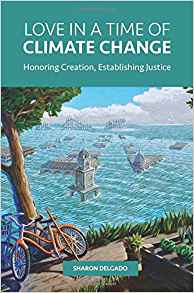Love in a Time of Climate Change
Rev. Sharon Delgado’s Love in a Time of Climate Change: Honoring Creation, Establishing Justice is a “faith response to climate change” (p. 178) that tells the truth about how far down the road we already are in global warming, while simultaneously giving us hope for transformation – IF we have the political will to take action for systemic lifestyle changes.
Many books talk about changing our individual lifestyles, and several dare to call us to systemic changes we need to do. But Love in a Time provides two distinctive things beyond that:
- First, it acknowledges the equal importance of overcoming readers’ emotional blocks of guilt and denial, as well as presenting scientific information about global warming and its consequences. This book goes for motivation, not just information, and lays out thirteen real, powerful things we can do if we join the global coalitions of activists, youth, Indigenous peoples, women’s groups and others who lead in the same direction.
- Second, it provides the essential connection between caring for the earth and its creatures (“honoring creation”), and “establishing justice” with advocates for a terrifying number of other species already facing extinction as well as poor and Indigenous people, who live in the regions most vulnerable to climate extremes and “sacrifice zones” polluted by fossil-fuel extraction and overconsumption.
The basis from which Love in a Time speaks could have been the Intergovernmental Panel on Climate Change (2014), a stunning consensus of global climate-change scientists across continents who have measured global warming caused largely by human-induced greenhouse gas emissions (17-20). But instead, it explores and stands on John Wesley’s four sources of authority: scripture, tradition, reason, and experience. Using each of these viewpoints, Rev. Delgado unpacks Romans 8:18-26 to hear creation’s groans, affirm our creaturely interrelatedness, and seek the presence and advocacy of the indwelling Holy Spirit. Then in the book’s second half, on “establishing justice,” the author digs into the story of the Good Samaritan (Luke 10:25-37), leading us not just to healing victims, but also admitting our own complicity and taking responsibility to help transform the entire “Jericho Road.”
Love in a Time of Climate Change: Honoring Creation, Establishing Justice is well worth reading, studying in a group, and taking action as part of one of the many Internet-linked networks that are working on this urgent, paramount issue.
Your partner in ministry,
Betsy Schwarzentraub
See also: Sources of Authority and John Wesley’s Theology of Creation


